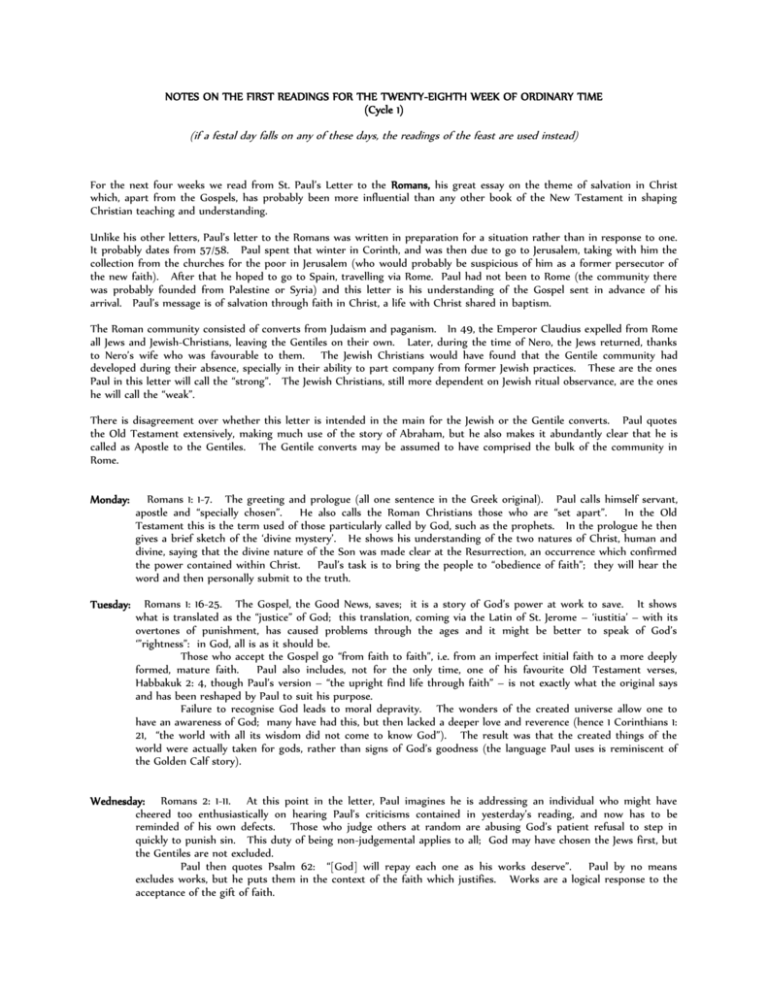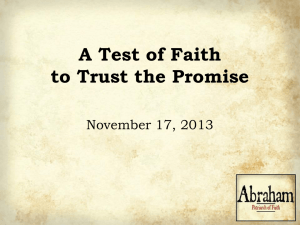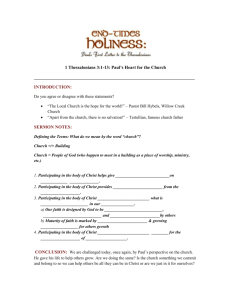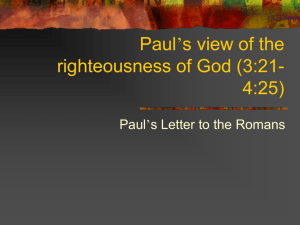Word document
advertisement

NOTES ON THE FIRST READINGS FOR THE TWENTY-EIGHTH WEEK OF ORDINARY TIME (Cycle 1) (if a festal day falls on any of these days, the readings of the feast are used instead) For the next four weeks we read from St. Paul’s Letter to the Romans, his great essay on the theme of salvation in Christ which, apart from the Gospels, has probably been more influential than any other book of the New Testament in shaping Christian teaching and understanding. Unlike his other letters, Paul’s letter to the Romans was written in preparation for a situation rather than in response to one. It probably dates from 57/58. Paul spent that winter in Corinth, and was then due to go to Jerusalem, taking with him the collection from the churches for the poor in Jerusalem (who would probably be suspicious of him as a former persecutor of the new faith). After that he hoped to go to Spain, travelling via Rome. Paul had not been to Rome (the community there was probably founded from Palestine or Syria) and this letter is his understanding of the Gospel sent in advance of his arrival. Paul’s message is of salvation through faith in Christ, a life with Christ shared in baptism. The Roman community consisted of converts from Judaism and paganism. In 49, the Emperor Claudius expelled from Rome all Jews and Jewish-Christians, leaving the Gentiles on their own. Later, during the time of Nero, the Jews returned, thanks to Nero’s wife who was favourable to them. The Jewish Christians would have found that the Gentile community had developed during their absence, specially in their ability to part company from former Jewish practices. These are the ones Paul in this letter will call the “strong”. The Jewish Christians, still more dependent on Jewish ritual observance, are the ones he will call the “weak”. There is disagreement over whether this letter is intended in the main for the Jewish or the Gentile converts. Paul quotes the Old Testament extensively, making much use of the story of Abraham, but he also makes it abundantly clear that he is called as Apostle to the Gentiles. The Gentile converts may be assumed to have comprised the bulk of the community in Rome. Monday: Romans 1: 1-7. The greeting and prologue (all one sentence in the Greek original). Paul calls himself servant, apostle and “specially chosen”. He also calls the Roman Christians those who are “set apart”. In the Old Testament this is the term used of those particularly called by God, such as the prophets. In the prologue he then gives a brief sketch of the ‘divine mystery’. He shows his understanding of the two natures of Christ, human and divine, saying that the divine nature of the Son was made clear at the Resurrection, an occurrence which confirmed the power contained within Christ. Paul’s task is to bring the people to “obedience of faith”; they will hear the word and then personally submit to the truth. Tuesday: Romans 1: 16-25. The Gospel, the Good News, saves; it is a story of God’s power at work to save. It shows what is translated as the “justice” of God; this translation, coming via the Latin of St. Jerome – ‘iustitia’ – with its overtones of punishment, has caused problems through the ages and it might be better to speak of God’s ‘”rightness”: in God, all is as it should be. Those who accept the Gospel go “from faith to faith”, i.e. from an imperfect initial faith to a more deeply formed, mature faith. Paul also includes, not for the only time, one of his favourite Old Testament verses, Habbakuk 2: 4, though Paul’s version – “the upright find life through faith” – is not exactly what the original says and has been reshaped by Paul to suit his purpose. Failure to recognise God leads to moral depravity. The wonders of the created universe allow one to have an awareness of God; many have had this, but then lacked a deeper love and reverence (hence 1 Corinthians 1: 21, “the world with all its wisdom did not come to know God”). The result was that the created things of the world were actually taken for gods, rather than signs of God’s goodness (the language Paul uses is reminiscent of the Golden Calf story). Wednesday: Romans 2: 1-11. At this point in the letter, Paul imagines he is addressing an individual who might have cheered too enthusiastically on hearing Paul’s criticisms contained in yesterday’s reading, and now has to be reminded of his own defects. Those who judge others at random are abusing God’s patient refusal to step in quickly to punish sin. This duty of being non-judgemental applies to all; God may have chosen the Jews first, but the Gentiles are not excluded. Paul then quotes Psalm 62: “[God] will repay each one as his works deserve”. Paul by no means excludes works, but he puts them in the context of the faith which justifies. Works are a logical response to the acceptance of the gift of faith. Thursday: Romans 3: 21-30. This is an extremely important reading containing the kernel of Paul’s thought. Many hold that the skeleton of the argument predates Paul, and that Paul has built upon it. God’s “justice” (i.e. uprightness, see Tuesday) has been revealed in the New Age marked by the coming of Christ. Through sin, humans had lost their true destiny, intended by God, of sharing in his glory; through Christ, however, they are reunited with that destiny. They are “justified” (i.e. made upright), as though in the Father’s law-court, not by their own initiative, but by God’s totally free gift of his Son. They are “redeemed” (bought back, as if from slavery) by the price of the Son’s blood. The text says that the Son was “appointed” by God to this, but the meaning may also be ‘publicly displayed’ (on the Cross), which removes the suggestion that the Father has sadistically willed the death of the Son. The benefits of this salvation come to us through faith; the sins of the past, which otherwise would have been awaiting some future final Day of Atonement, are taken away by the Son. The Old Law, which people struggled to keep in its totality, was a Law of deeds; the New Law is a law of faith. Paul says that “man is justified by faith”. Luther added in his translation the word ‘only’, thus creating one of the central questions of the Reformation, though it is worth mentioning that Catholic theologians before him had sometimes come very close to saying the same thing themselves. Part of the problem is that Paul writes “deeds” as shorthand for ‘deeds of the Law (the Old Law)’. Paul was not denying the role of deeds in the Christian life, though he insisted on the prime place of faith. It may well be that the later Letter of St. James (which Luther called an “Epistle of straw”), with its renewed emphasis on deeds, was an attempt to correct misunderstandings of Paul by some who held that deeds were irrelevant. Friday: Romans 4: 1-8. To support his argument, Paul turns to Abraham, who pre-dated the Law of Moses and so could not possibly be justified by the Old Law. He was the father of “us all” (Paul is thinking of his own Jewish ancestry). The rabbinic view in Paul’s time was that Abraham was a doer of the Law in anticipation, by virtue of his obedience to God, but Paul has none of this. Through his faith alone, Abraham was “considered as justified” (a term Paul takes from accountancy; Abraham was ‘in the black’). God did not owe Abraham any payment; he considered him upright by virtue of his own free gift. Paul then extends this argument, via a quotation from Psalm 31, to all those who come afterwards. Saturday: Romans 4: 13, 16-18. God’s specific gift to Abraham, through faith and not the Law, was the promise of heirs. This promise extends to all who share Abraham’s faith. Referring to Abraham’s name, meaning ‘father of many nations’, Paul extends the title to include all the Gentiles. The divine power once shown at work in removing the sterility of Abraham’s wife Sarah is at work for the benefit of all in the Resurrection of Jesus Christ.










